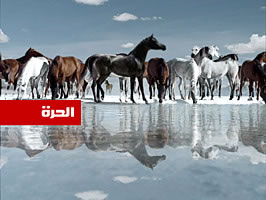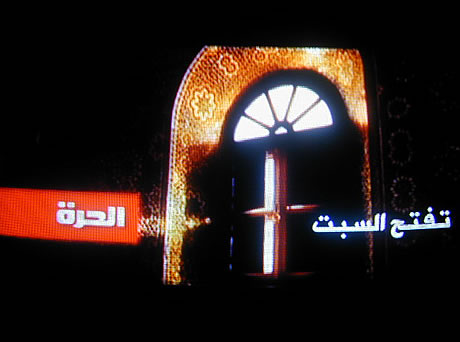Horsing
around
When will
the Arabs find their own voice?
by Tarek Atia
Among media consumers
Arabs are the smartest, says Mouafac Harb, news director of the
new US-funded Arabic language satellite channel Al-Hurra.
Ironically, Harb's acknowledgement that Arabs are
"politically savvy" when it comes to news casts doubt
on the channel's very mission.
Armed with $62 million in
Congressional funding the channel's goal is to convince Arabs
there is an alternative. On the surface that means an
alternative to Al-Jazeera, the channel that has inspired so much
anger, first in the Arab world and, latterly, from the United
States.
The channel's slick
promos -- developed by Martin Lambie-Nairn, the company that
came up with the idea for Spitting Image, the British puppet
satire show -- feature windows opening onto wide vistas, and
horses running free, as well as the kinds of inspirational
snippets you find on office walls -- "You think, you
aspire, you choose, you express, you are free."
Norman Pattiz, a member
of the Broadcasting Board of Governors, the US entity that
oversees the project, describes the Arabian stallion in the
channel's promo ads as "a symbol of great respect and great
pride within the region... a symbol of freedom... a symbol of
openness."
 And
true, the horses do run free, though the lasting image is of
them at rest, beside a lake in a desert amid surreal white snow.
Harb insists the horses are "not standing, they're coming
together". And
true, the horses do run free, though the lasting image is of
them at rest, beside a lake in a desert amid surreal white snow.
Harb insists the horses are "not standing, they're coming
together".
More to the point, the
majority of Arab viewers are probably unaware the horses are
Arabian.
Many commentators have
refrained from judging Al-Hurra on just a few broadcasts, or
else have assumed the channel will mask its true intentions by
airing news items they assume Arabs will like. One was surprised
to see a lead item on Bishop Tutu's condemnation of Bush and
Blair.
The reaction in Cairo,
and across the Middle East, to the broadcasts which began on
Saturday has been lukewarm. By mid-week some were still trying
to find it on the dish. Others were surprised to discover shows
on apes, dolphins and the Ancient Egyptians. The news, of
course, was what most people wanted to see, and that only came
in snippets. A strange selection of items ensued. Many on Iraq,
including non-headline news like China getting a rebuilding
contract, then brief items on a demonstration in Palestine, the
situation in Haiti, and a giant panda being returned to China.
Ahmed Ibrahim, a
31-year-old computer engineer, thought the newscast
"frivolous. The selection was too ideological," he
said, "too much like propaganda." Ibrahim also
lamented the "very trivial" amount of time dedicated
to the Palestinian issue.
Harb defended the
newscast, insisting it was tailored to a Middle Eastern
audience, with issues "that people relate to and want to
know about".
On Monday a 10-minute
newscast ended with a sudden transition to a canned cable
programme on the world's "Great Chefs". Another
programme includes something about fashion shows for prisoners.
In many ways the channel looks like a televised version of hi
magazine, another US-funded project intended to disseminate fair
and balanced news to the Arab world that has been dismissed by
many as glossy but ultimately irrelevant.

"It's not
fundamentally different from the US media," said marketing
specialist Iman Hamed, "and it won't make a
difference." Other initial viewer complaints focussed on
presenters making mistakes and giggling, or being fidgety and
distracting.
The channel's presenters
are all "serious professionals", Harb said. The staff
of 200 is mostly Lebanese and Egyptian -- a mix of
Arab-Americans and Arabs from Qatar to Sudan who moved to the US
for the job. Asked if it was hard to recruit Arab journalists
for a project funded by the US government, Harb said that if the
channel gained as many viewers as the number of resumes in his
inbox, they would be doing okay.
How okay, most
commentators agree, depends on the channel's political coverage.
People are bound to watch at first, if only out of curiosity.
But considering the initial reaction that might not last long.
The view of many of those spoken to by cairolive.com is that
Al-Hurra's news is "biased".
Asked why a talk show
called Sa'a Hurra (Free Hour) mimicked the White House view that
post Iraq-war violence is generated purely by Al-Qa'eda, Harb
suggested a referendum be conducted to find out if Iraqis really
supported what he termed the "so-called resistance".
While most Arabs seem to have a more positive view of armed
resistance in Iraq, Al-Hurra's editorial policy on that issue
will surely remind viewers who pays the piper.
Al-Hurra may be
"state funded" but it's not "state run",
Harb says. "That kind of comparison could only be made if
the political system in the US was like the ones in the Arab
world. If I get a call from the State Department criticising my
coverage, I say thank you very much."
Harb says he doesn't
"recall getting a single phone call. There is no precedent
of anyone from the outside criticising."
Although that unspoken
thumbs-up from Washington may actually translate into an
outspoken thumbs-down from "politically savvy" Arab
viewers, at least Harb would have done his job.
In any case, Al-Hurra's
news director says the channel will wait for clearer feedback on
its performance.
"We go for
scientific research," he said. "If Mustafa Bakri
writes a piece, that is not a reaction."
Bakri, editor of the
weekly newspaper Al-Osbou', was one of the first to comment on
the channel, telling the Associated Press on the day it was
launched that it was a "means to achieve American plans to
dominate and control the Arab world".
WHAT
DO YOU THINK?

MAKE YOUR
VOICE HEARD
Send a comment to cairolive.com
|